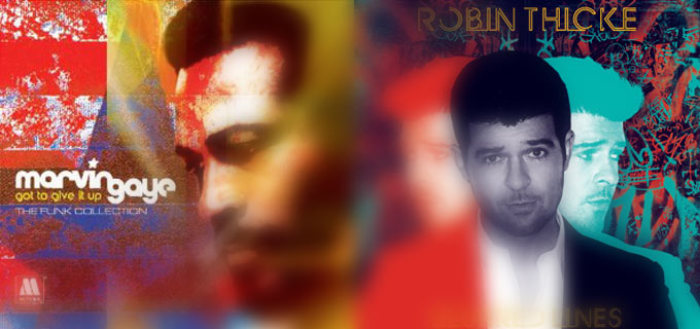It’s all over the news. It’s trending. The “Blurred Lines” lawsuit between Robin Thicke/Pharrell Williams and Marvin Gaye’s estate/family took about two years and has concluded with a decision that holds Thicke and Pharrell responsible for paying $7.3 million in damages and royalties.
Wow. This is now the highest compensation amount ever levied in a copyright infringement suit.
I won’t go into all of the details, which can be summed up pretty well in a March 10, 2015 Rolling Stone article. And CNN‘s report on the subject includes commentary from a respected journalist as well as a radio executive, with side-by-side video comparison of the two songs.
Let me start off the bat by stating that I like what I’ve seen of Pharrell Williams. He seems like a pretty cool and sincere guy, at least that’s how he’s portrayed as a coach on The Voice (as a vocalist it’s interesting for me to see people of all ages, musical genre’s and experiences audition—once they get into the mass-produced performances I lose interest). As for Robin Thicke…I typically don’t follow a lot of top 40 pop, so I’m not really familiar with him. But I’m curious about a few things. (I’m always curious about something, right?)
First of all, when Thicke and Williams were creating this song, didn’t anyone detect the pretty obvious similarity to Gaye’s “Got to Give it Up” when they were hashing out the music and arrangements? Thicke admitted he told Williams they should write a song with the same “groove.” Well, percussion…falsetto lead vocals…bass line…background “crowd” are just too similar, and plenty of people online have said they initially thought the song was a cover of “Got to Give it Up.” According to Thicke himself, besides saying he’s a huge Gaye fan, he admitted he was drunk and high on Vicodin when he wrote the song. Ooops! Is that really legitimate rationale to get out of a lawsuit? Thicke already has settled with the family for two other songs on his 2011 Love After War album (the family has stated Thicke had a “Marvin Gaye fixation.”). Hmmmm.
Secondly, you can’t copyright a genre or groove of music—when you hear a blues shuffle and 1-4-5 progression in hundreds of songs, the lyrics and melodies and other nuances make the songs individual. But what is interesting (according to the Rolling Stone article) is that Gaye’s voice, the backup vocals and some of the percussion are not covered by Gaye’s copyright. The sheet music is the only thing the jury was to consider. And yet the jury still found Thicke and Williams guilty of copyright infringement. To almost anyone who hears both tunes, there is a lot more similarity than just inspiration from Marvin Gaye or groove, unfortunately. Come on…everyone was comparing the songs as soon as “Blurred Lines” was released a couple of years ago.
So does this decision set a precedent and slippery slope for enforcement in the music industry? You bet it does. According to Parker Higgens*, director of copyright activism at the Electronic Frontier Foundation, “When we say a song ‘sounds like’ a certain era, it’s because artists in that era were doing a lot of the same things—or, yes, copying each other. If copyright were to extend out past things like the melody to really cover the other parts that make up the ‘feel’ of a song, there’s no way an era, or a city, or a movement could have a certain sound. Without that, we lose the next disco, the next Motown, the next batch of protest songs.”
For musicians in the digital age who can easily sample someone’s melody or hook or drum track…better get permission before you make that CD. People will probably be watching—and listening—a little closer.
In the meantime, we will probably see an appeal from Robin Thicke and Pharrell Williams….
* Higgens’ article on Ratter goes into a lot more depth about the case, copyright and the tightrope the music industry may need to navigate moving forward with the March 10 “Blurred “Lines” verdict. Interesting read.
Here’s a bit of a mash-up: “Blurred Lines” vs “Got to Give it Up”
What do you think?






